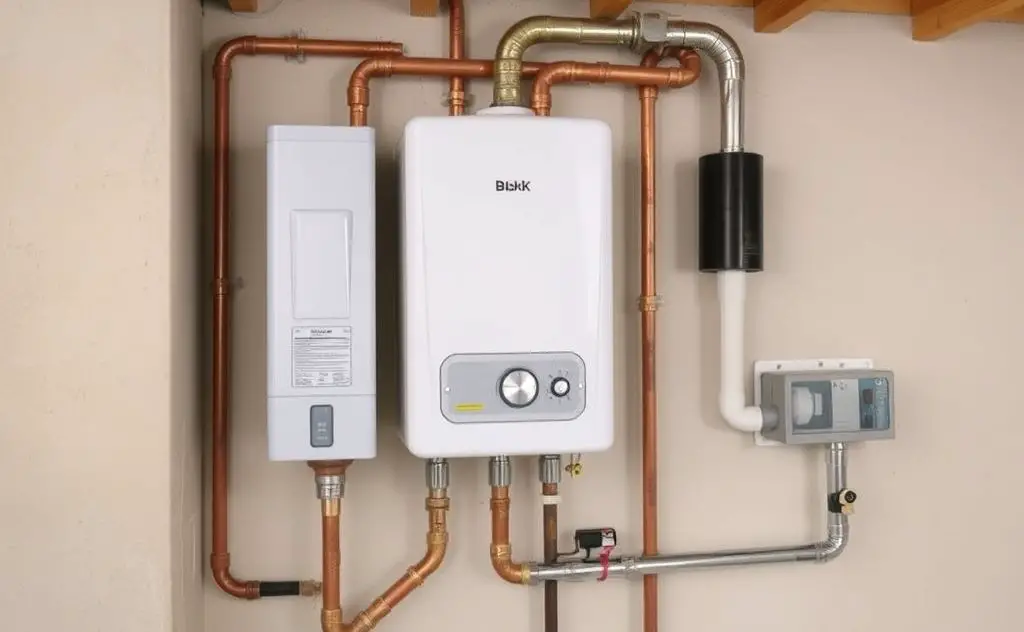No, a tankless water heater typically does not need an expansion tank, as it heats water on demand and generally does not create the same pressure buildup as traditional tank water heaters, but local codes and specific installation circumstances should always be checked.
Tankless water heaters have become popular for their energy efficiency and endless hot water supply. But homeowners often wonder if they need an expansion tank like traditional tank water heaters. The short answer is no, tankless heaters don’t require expansion tanks in most cases. However, there are exceptions you should know about.

How Tankless Water Heaters Differ From Tank Models
Traditional water heaters store and constantly heat water in a tank. As water heats, it expands, creating pressure that needs relief. This is why expansion tanks are required for tank water heaters in closed plumbing systems.
Tankless units work differently. They only heat water when you turn on a hot water tap. The heating stops immediately when you turn off the faucet. Since there’s no stored water being continuously heated, thermal expansion isn’t an issue in most installations.
When Might You Need an Expansion Tank?
While generally not required, there are situations where an expansion tank makes sense with tankless systems:
- Closed plumbing systems: If your home has a backflow preventer or pressure-reducing valve that creates a closed system
- High water pressure: When incoming pressure exceeds 80 PSI (a pressure regulator is also needed)
- Recirculation systems: If you have a tankless water heater recirculation pump
- Manufacturer requirements: Some brands may specify expansion tanks in their installation manuals

Understanding Plumbing System Types
Whether you need an expansion tank depends largely on your plumbing system configuration:
| System Type | Expansion Tank Needed? |
|---|---|
| Open system (no backflow preventer) | No |
| Closed system (with backflow preventer) | Yes |
Why Closed Systems Are Different
In closed systems, check valves prevent expanded water from flowing back into the municipal supply. This trapped expansion can cause dangerous pressure buildup. An expansion tank provides a cushion for this expanded water.
Safety Considerations
While expansion tanks aren’t typically required for tankless units, safety valves are essential:
- Temperature and pressure (T&P) relief valve: Required by most codes
- Pressure relief valve: Some manufacturers recommend these instead of T&P valves
As noted in our guide to water heater error codes, proper safety devices help prevent dangerous malfunctions.
Installation Best Practices
If you do need an expansion tank for your tankless system:
- Install it on the cold water line
- Place it downstream of any pressure regulators
- Keep it close to the water heater (within 1-2 feet)
- Ensure proper pre-charge pressure in the tank
Location Options
You can install the expansion tank either:
- Between the water softener and tankless unit
- After the tankless unit before fixtures
As one plumbing expert noted, “It matters not where on the cold side the tank is as long as it is downstream of the regulator/checkvalve.”
Manufacturer Recommendations Vary
Some manufacturers like Rheem may recommend expansion tanks in their installation manuals, while others don’t require them. Always check your specific model’s requirements. For example, Navien tankless units with buffer tanks may need expansion tanks.
If you’re considering a propane tankless water heater, be aware that gas requirements are often more critical than expansion tank needs.
Professional Assessment Recommended
While most tankless installations don’t need expansion tanks, your specific plumbing configuration may be different. A licensed plumber can evaluate:
- Your home’s water pressure
- Presence of check valves or backflow preventers
- Local plumbing code requirements
- Manufacturer specifications
As one forum contributor wisely noted, “Every system has a personality.” What works for one home may not be ideal for another.
